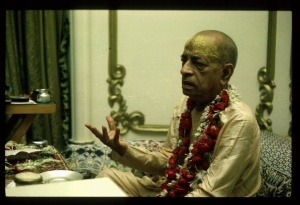BG 18.11 (1972)

His Divine Grace
A.C. Bhaktivedanta Swami Prabhupada
A.C. Bhaktivedanta Swami Prabhupada
TEXT 11
- न हि देहभृता शक्यं त्यक्तुं कर्माण्यशेषतः ।
- यस्तु कर्मफलत्यागी स त्यागीत्यभिधीयते ॥११॥
- na hi deha-bhṛtā śakyaṁ
- tyaktuṁ karmāṇy aśeṣataḥ
- yas tu karma-phala-tyāgī
- sa tyāgīty abhidhīyate
SYNONYMS
na—never; hi—certainly; deha-bhṛtā—of the embodied; śakyam—possible; tyaktum—to renounce; karmāṇi—activities of; aśeṣataḥ—altogether; yaḥ tu—anyone who; karma—work; phala—result; tyāgī—renouncer; saḥ—he; tyāgī—the renouncer; iti—thus; abhidhīyate—it is said.
TRANSLATION
It is indeed impossible for an embodied being to give up all activities. Therefore it is said that he who renounces the fruits of action is one who has truly renounced.
PURPORT
A person in Kṛṣṇa consciousness acting in knowledge of his relationship with Kṛṣṇa is always liberated. Therefore he does not have to enjoy or suffer the results of his acts after death.